Pathophysiology (Pathophysiology)
Rasmussen College
Page 3 out of 43 results
Sort by
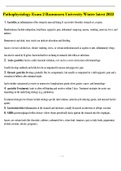
-
BUNDLED Pathophysiology Exams Set package deal, Rasmussen’s college with latest Questions and Answers solutions guide 2023
- Package deal • 15 items • 2023
-
- $50.49
- + learn more
BUNDLED Pathophysiology Exams Set package deal, Rasmussen’s college with latest Questions and Answers solutions guide 2023

-
Pathophysiology Exam 2 Rasmussen College Winter latest 2023 update Questions and Answers.
- Exam (elaborations) • 24 pages • 2023
- Available in package deal
-
- $11.49
- + learn more
1. Gastritis: an inflammation of the stomachs mucosal lining. It can involve the entire stomach or a region. Manifestations: Include indigestion, heartburn, epigastric pain, abdominal cramp- ing, nausea, vomiting, anorexia, fever, and malaise. Hematemesis and dark, tarry stools can indicate ulceration and bleeding. Causes: excessive alcohol use, chronic vomiting, stress, or certain medications such as aspirin or anti- inflammatory drugs. Can also be caused by H. pylori- bacteria that...
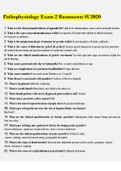
-
Pathophysiology Exam 2 Rasmussen SU2020 verified solution A+ RATED
- Exam (elaborations) • 8 pages • 2023
- Available in package deal
-
- $11.49
- + learn more
1. What are the clinical manifestations of appendicitis? right lower abdominal pain, nausea and occasionally diarrhea 2. What is the cause of pseudomembranous colitis? overgrowth of Clostrid- ioides difficile (C difficile) bacteria; overexposure to antibiotics 3. What is the nonpharmacologic treatment for pseudo colitis? fecal trans- plant, colectomy, antibiotics 4. What is the cause of Helicobacter pylori (H. pylori)? bacteria spread from person to person; bacteria penetrates the stomach muc...
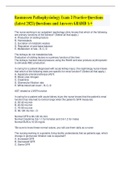
-
Rasmussen Pathophysiology Exam 3 Practice Questions (Latest 2023) Questions and Answers GRADED A+
- Exam (elaborations) • 28 pages • 2023
- Available in package deal
-
- $11.49
- + learn more
The nurse working in an outpatient nephrology clinic knows that which of the following are primary functions of the kidneys? (Select all that apply.) A. Production of clotting factors B. Homeostasis C. Excretion of metabolic wastes D. Regulation of acid-base balance E. Metabolism of fats - B, C, D The kidneys do not metabolize fats. Production of clotting factors is a primary function of the liver. The kidneys maintain blood pressure using the RAAS and also produce erythropoietin t...
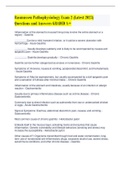
-
Rasmussen Pathophysiology Exam 2 (Latest 2023) Questions and Answers GRADED A+
- Exam (elaborations) • 20 pages • 2023
- Available in package deal
-
- $11.49
- 1x sold
- + learn more
Inflammation of the stomach's mucosal lining (may involve the entire stomach or a region) - Gastritis _________Can be a mild, transient irritation, or it cab be a severe ulceration with hemorrhage - Acute Gastritis _________ Usually develops suddenly and is likely to be accompanied by nausea and epigastric pain - Acute Gastritis _________ Gastritis develops gradually. - Chronic Gastritis Gastritis can be further categorized as erosive or nonerosive - Chronic Gastritis Symptoms of...
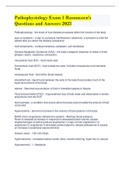
-
Pathophysiology Exam 1 Rasmussen’s Questions and Answers 2023
- Exam (elaborations) • 6 pages • 2023
- Available in package deal
-
- $11.09
- + learn more
Pathophysiology - the study of how disease processes affect the function of the body sign vs symptom - a sign is a physical manifestation (objective), a symptom is what the patient tells you about the disease (subjective) Cell components - nucleus/nucleolus, cytoplasm, cell membrane General Adaptation Syndrome (GAS) - the body's adaptive response to stress in three phases—alarm, resistance, exhaustion. Intracellular fluid (ICF) - fluid inside cells Extracellular fluid (ECF) - fl...
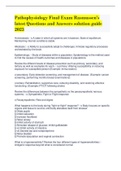
-
Pathophysiology Final Exam Rasmussen’s latest Questions and Answers solution guide 2023
- Exam (elaborations) • 13 pages • 2023
- Available in package deal
-
- $11.49
- + learn more
Homeostasis - o A state in which all systems are in balance. State of equilibrium. Maintaining internal conditions stable. Allostasis: - o Ability to successfully adapt to challenges. Intricate regulatory processes orchestrated by the brain. Epidemiology: - Study of diseases within a population. Epidemiology is the method used to find the causes of health outcomes and diseases in populations. Review the different levels of disease prevention such as primary, secondary, and tertiary as w...
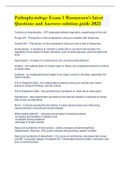
-
Pathophysiology Exam 1 Rasmussen’s latest Questions and Answers solution guide 2023
- Exam (elaborations) • 12 pages • 2023
- Available in package deal
-
- $11.99
- 1x sold
- + learn more
Function of mitochondria - ATP production/cellular respiration, powerhouse of the cell Rough ER - That portion of the endoplasmic reticulum studded with ribosomes. Smooth ER - That portion of the endoplasmic reticulum that is free of ribosomes. Homeostasis - A tendency to maintain a balanced or constant internal state; the regulation of any aspect of body chemistry, such as blood glucose, around a particular level Hypertrophy - increase in muscle/tissue size, excessive development ...
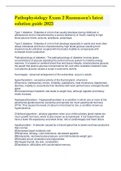
-
Pathophysiology Exam 2 Rasmussen’s latest solution guide 2023
- Exam (elaborations) • 7 pages • 2023
- Available in package deal
-
- $11.49
- + learn more
Type 1 diabetes - Diabetes of a form that usually develops during childhood or adolescence and is characterized by a severe deficiency of insulin, leading to high blood glucose levels. polyuria, polydipsia, polyphagia. Type 2 diabetes - Diabetes of a form that develops especially in adults and most often obese individuals and that is characterized by high blood glucose resulting from impaired insulin utilization coupled with the body's inability to compensate with increased insulin production...
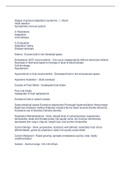
-
Pathophysiology Review Exam 1 Rasmussen’s latest 2023 solution guide
- Exam (elaborations) • 21 pages • 2023
- Available in package deal
-
- $11.49
- + learn more
Stages of general adaptation syndrome - 1. Alarm Initial reaction Sympathetic nervous system 2. Resistance Adaptation Limit stressor 3. Exhaustion Adaptation failing Disease develops Edema - Excess fluid in the interstitial space Dehydration (ECF volume deficit) - Can occur independently without electrolyte defects Decrease in fluid level leads to increase in level of blood solutes Cell shrinkage Hypotension Hypovolemia or fluid volume deficit - Decreased fluid ...

Did you know that on average a seller on Stuvia earns $82 per month selling study resources? Hmm, hint, hint. Discover all about earning on Stuvia


